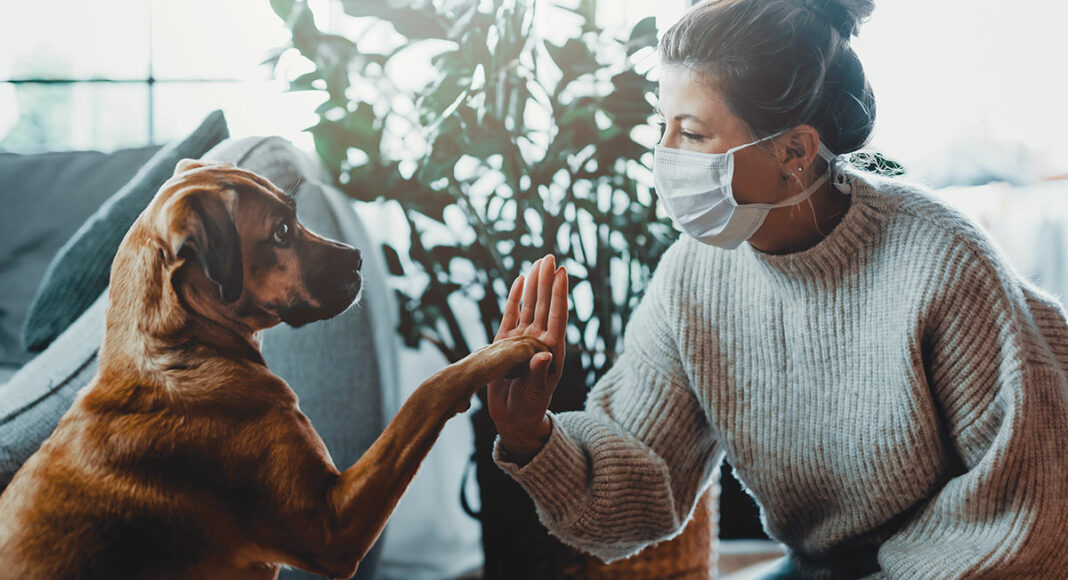Just as with people, the Covid-19 pandemic and its disruptions to daily life can take a psychological toll on pets. What happens to the family dog, for instance, when her human companions are all suddenly at home around the clock? How does he respond when his walk and exercise routines are upended? And how does she react to everyone wearing masks?
Mardi Richmond is a professional certified dog trainer and the owner/operator of Good Dog Santa Cruz, where she specializes in issues with puppies and adolescent dogs. She says that the shelter-in-place era has had both its positive and not-so-positive outcomes for dogs as well as their human companions.
“For people, it’s sometimes surprising when you spend so much more time with your dog that those things that were little annoyances are, when you’re around them all the time, all of a sudden big annoyances, kind of like it can be with your spouse or your kids,” Richmond says.
Dogs are generally comfortable with routine—and Covid-19 has been the ultimate routine disruptor. “Changes in routine can be stressful for dogs,” Richmond says. “And when dogs are stressed, they do behaviors that people don’t like. I can’t say that they are problem behaviors exactly, because they are dog behaviors.”
There are practical concerns regarding dogs and the spread of Covid-19. The federal Centers for Disease Control and Prevention has reported that animals including pets can be infected by, and can spread, the virus. And the CDC suggests that pets not be permitted to interact with people outside their household, though the agency deems the risk of spread from animals to humans to be low.
But most dog lovers are dealing with the behavioral and mental-health issues that have spiked since the pandemic lockdown. For example, dogs used to their owners’ absence during most of the day, while at work, often sleep most of that time. When owners are at home all day, dogs may become sleep-deprived, says Richmond, “like that toddler who is overtired and kind of gets antsy and reactive.”
It’s important, say pet specialists, to maintain schedules, even while sheltering in place. Dogs respond best by having meals and exercise take place in a predictable pattern.
“They are definitely having to learn a new norm. It usually takes a few days to adjust when you set a new schedule. But some people are not setting schedules. Until they get on a new schedule, dogs are always going to be a little off-kilter.”
Much like humans, Richmond says, dogs may simply be missing their friends and acquaintances in the neighborhood. And social distancing rules only bring on confusion. “They’re missing the social interaction. Even on a walk, dogs will often say hi to the neighbor. Now we’re saying, ‘No, don’t go say hi to Joe down the street. You have to stay away.’”
Dogs are also now seeing humans wearing face coverings. Dogs depend on other cues to identify individuals, including scent, the sound of someone’s voice, even the way they walk or move. Richmond’s experience in recent weeks is that dogs’ reaction to masks are as different as their personalities. “Some dogs are completely unfazed by it. Other dogs seem really freaked out by not seeing people’s faces. They don’t know how to respond.”
There are ways that dog owners can help their pets get used to face coverings. The trick is to introduce it gradually, put it on around the house for short periods, allow the dog to sniff the mask and get close to it.
Another potential behavioral trouble spot has to do with people coming and going in the household. In normal times, those visitors can be familiar “friends,” but during the pandemic, that foot traffic has slowed down if not ceased altogether, except in the case of home deliveries, which have increased dramatically. “Deliveries are pretty stressful for dogs,” Richmond says. “And it’s a huge stressor for people, too, when our dogs suddenly erupt.”
The challenges for dog professionals during the Covid-19 crisis have been exacerbated by the phenomenon of “pandemic puppies,” a reported spike in puppy adoptions over the last three months. These dogs may not be getting the kind of socialization that is needed to adapt to a new household.
“As long as you’re forward thinking about ‘What will my puppy need to handle this long-term,’ and you’re putting those steps in place as well, they’ll be fine,” Richmond says. “If you’re not teaching them home-alone skills because you’re already home all the time, that’s going to be a problem, for sure.”
What’s true for new puppies is also true for other dogs as well. The key, says Richmond, is to prepare your pet to adapt to different circumstances and routines.
“Most of these challenges can be mitigated with just a little bit of thoughtfulness,” she says. “When life is predictable, their stress goes down a lot. If we’re really looking at what our dogs’ needs are, if we’re making sure they get enough exercise and activity, as well as rest, all that can be super advantageous. It’s really about taking it really slowly and setting up your dog for success when routines change.”













